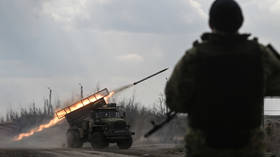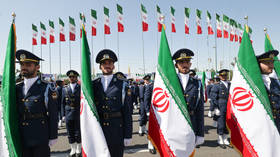Timofey Bordachev: This major pillar of Western civilization is crumbling. Here’s why

We can already see that modern states are facing such serious challenges that foreign policy is being subordinated to domestic considerations everywhere. This is true of Western countries, Russia, China, India, and everyone else. Indeed, it highlights what existing academic theories are unable to understand simply because of their methodology.
One of the curious effects of the two world wars of the last century, and in particular of the emergence of incredibly power weapons in the possession of several powers – the mass use of which could lead to the cessation of sentient life on the planet – has been to increase the importance of the foreign policy activities of states in the broad sense. The horror that a military catastrophe would be universal and irreversible in its consequences, which gradually became apparent and finally became firmly rooted in the minds of people, has firmly placed questions of international stability among the first priorities for the public.
In addition, industrial-scale warfare and economic globalization have contributed to the growing importance of issues directly related to external factors. The latter has, to a certain extent, linked the development and even the very existence of any given state to the tasks it undertakes in the international arena. This has especially been true for medium-sized and small countries for which the waters of the modern world are too shark-infested to offer the possibility of a fully independent existence. But even in the case of the great powers, foreign policy issues have become so important over the past century that they are almost on a par with domestic concerns.
Moreover, the now universal market economy and comparative openness have indeed reduced the ability of different governments to fully determine the parameters of domestic development on their own. This has reinforced the perception that success or failure in the crucial task of keeping citizens happy will be decided via a country’s integration in the global system, which will solve most problems by itself. The practical consequence of this has been a historically unimaginable expansion of the diplomatic apparatus and, more generally, of the institutions that manage foreign relations. Huge numbers of officials, imbued with a sense of the importance of their work and their profession, are now responsible for their countries’ external affairs.
And in this sense the global system of states has indeed been moving towards the European medieval model, in which the government could interfere little in the daily lives of its subjects, especially in the spiritual life, and was happy to concern itself exclusively with foreign policy tasks. Only those powers that have most preserved the primacy of the national over the global could afford to retain sovereignty in the traditional sense of the word. First of all, this describes the United States, whose prioritizing of domestic policy over foreign policy gradually became a unique feature that has distinguished the superpower from all other countries in the world. But this order, which suited everyone, is now beginning to break down.
The first signs that things were moving towards something fundamentally new came with the emergence of such “universal” problems as various manifestations of climate change, plus the internet and the information revolution, and artificial intelligence. Some ten to fifteen years ago, the late Henry Kissinger was the first of the great thinkers of our time to point out that “problems are global, but their solutions remain national.” With this statement, the eminent statesman wanted to draw attention to the fact that the international community was not ready to develop consolidated approaches to solving problems that affect everyone.
Rich, poor, and developing countries alike have been unable to make decisions based on a strategy of minimizing the losses of each while achieving a comparative good for all. The most striking example has been the development of international cooperation on climate change. In the space of a few years, it has evolved into a series of transactions between states based on the interests of their corporate sectors and related governmental preferences, or, as in the case of Russia, on scientifically based public policies in this area that also take into account national economic interests. Thus, even during the period of Western dominance in world affairs, and indeed at its expense, states have failed to create a single “supranational” program to deal with the consequences of a phenomenon that threatens to seriously disrupt individual regions.
However, the problem is not limited to those issues, which have become relevant precisely as a result of recent changes and technological advances by mankind. The most important issue has been the growth of inequality, a concrete manifestation of which has been the decline in the incomes of large sections of the population and the gradual disappearance of the phenomenon of the “middle class” in most Western countries.
The problem was most pronounced during the coronavirus pandemic, when the least well-off suffered the most. In the United States, this resulted in huge human losses that no one really cared about because of the peculiarities of the local socio-economic structure. In Russia, and most of the rest of Europe, the deaths of citizens from Covid were added to the already enormous costs of various types of social programs and health care. As a result of the intensive work of states to mitigate the immediate effects of the 2008-2009 crisis and the 2020-2022 pandemic, and at the same time to continue measures to stabilize budgets, the greatest concern now is the future of social programs that were the basis of welfare in the 20th century and the source of the wellbeing of the expansive middle class.
But soon this will lead to a general crisis of a system that has provided stability in the form of a middle class that relies on savings. Thus, we will see a general decline in the economic basis for citizens’ consent to the existing domestic political order. This applies primarily to Western countries, but Russia will not be spared the negative consequences of the collapse of a way of life that was at the center of the modern global economy and was the source of legitimacy for state intervention in the free market. All the more so because the consequences of the globalization of information, such as a certain erosion of control over the lives of subjects, have not disappeared. Even China, where the state’s information policy is the most consistent and subordinate to the tasks of the government and elites, faces this problem.
As a result, states have to focus more and more on their immediate tasks, such as maintaining public peace among citizens. In the case of growing international political powers such as China or India, their sheer demographic size puts domestic issues at the top of the agenda. As a result, foreign policy activities take a back seat and are only considered in the context of internal struggles for unity (Russia, China, India) or the retention of power by elites that have become virtually irremovable in recent decades (the United States and major European countries).
This process has two interesting implications at a theoretical and practical level.
First, there is growing confusion among those whose professional responsibility it is to analyze international politics. One of America’s most prominent realists, Stephen Walt, in his recent articles has angrily drawn attention to the way in which the US government’s foreign policy decisions deviate from the logic of international life. It is also not uncommon to hear claims from Russian analysts about politics as such being dominated by purely foreign policy rationality.
Second, there is a purely practical risk that governments preoccupied with domestic concerns will in fact pay insufficient attention to those issues of international life that remain fundamentally important. So far, the leading nuclear powers have shown themselves capable of looking after the survival of humanity, despite some shifts in their own priorities. One suspects, however, that it would be a little foolhardy to place all hope in the wisdom of our statesmen alone.
This article was first published by Valdai Discussion Club, translated and edited by the RT team.















